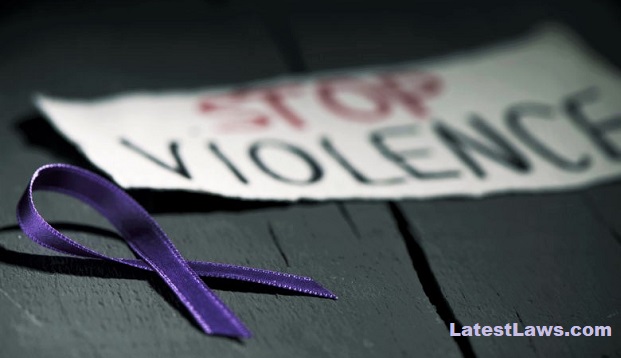On a normal day, he would not have heard the woman screaming. The gated colony in south Delhi, where he lives, is networked with roads that have fallen silent during the lockdown — so the sound of abuse carried clearly from the next door. Once he was sure of what he was listening to, the neighbour pulled on his mask, hurried to the adjoining flat and rang the bell.
It turned out that the husband was always abusive but, during the isolation, the beatings had become worse. The neighbour found the woman bruised, aching and trembling. She was not in a state to decide if she wanted to file a police complaint against her husband, so he called a gender abuse helpline and a doctor, who lived in the building, to counsel her.
One of the challenges of the lockdown is that people have been asked to stay at home and, for the majority of victims of domestic violence, this means being locked in with the abuser. “Under the circumstances, the neighbour is at the frontline of defence for many vulnerable women. Since houses are built close together in affluent as well as working-class areas, we need neighbours to step up and support women who are facing violence,” says Tamanna Basu, Honorary Strategic Manager at Shakti Shalini, a support organisation for women in Delhi.
Breakthrough India, famous for the anti-domestic violence campaign Bell Bajao in 2008, is working on another initiative on the importance of bystander intervention in cases of domestic violence. “Currently, victims are confined within their homes and have limited agency to seek assistance. Hence, those living in their vicinity can help out. Through our digital platforms, Breakthrough India has put out helpline numbers and been encouraging bystander intervention on this matter,” says Urvashi Gandhi, Director, Global Advocacy, Breakthrough India.
Arvinder J Singh, a psychotherapist and founder of the Centre for Well-Being at Ashoka University in Delhi says that people with mental-health issues are more likely to be victims of domestic violence. Anxiety and depression can make an abusive situation worse as the partner or in-laws may use the diagnosis against them for divorce and child custody. Most victims of domestic violence, therefore, are unlikely to approach neighbours directly, fearing judgement or loss of security (whether financial, physical or emotional). Any intervention is likely to be at the neighbour’s own initiative. Furthermore, women tend to adapt to suffering, often children or a lack of financial security becoming a reason to continue in the situation.
“People, who are abused, are fearful of reporting it, have low self-esteem and are traumatised. They feel unsafe in their homes and in the lockdown situation, this gets worse because there is no escape,” says Singh, adding that, in several cases, violence is well-hidden under the pretence of ‘a happy, normal family’ so much so that even their closest friends and neighbours find out much later.
She says:
One in three women in India faces domestic violence from the age of15, according to a survey released by the Union Ministry for Health and Family Welfare in 2018. Since the lockdown began on March 24, a lot of women have been calling up the National Commission for Women to complain of domestic abuse. The 181 Abhayam Women’s Helpline, a toll-free number operated by the Government of Gujarat and GVK EMRI, receives 3,500-4,000 calls from women in distress every day — as it did before the lockdown. One of the recent callers was a new bride from Ahmedabad who was sitting in an empty bus stop after being thrown out of her house by her husband and his mother late evening. Her neighbours had turned a deaf ear to her plea for help.
Unlike her, many women are not even reaching out for help. Several organisations are concerned that helplines are ringing less than they did before the lockdown. Only a frightened woman ever dials a helpline, unless she is with her perpetrator.
Basu said:
At Jagori, a women’s resource centre in Delhi, the calls have reduced by 50 per cent. The lockdown has also come with telephone network problems, due to which support service such as Bhagini helpline of Maharashtra, are not receiving any calls. “We typically received 50-60 calls daily before the lockdown, mostly from victims of domestic violence,” says advocate Supriya Kothari, who operates Bhagini helpline.
Even on regular days, helplines received calls in which women said, “Abhi woh ghar mein nahin hai. Aap call mat karna, hum apko call karenge”. With the lockdown, the women do not have the space or time to make these calls. “The first concern of a victim is to reach out for help secretly. She has to protect her immediate safety,” says Basu. Support staff and counsellors are also helpless as they cannot travel, courts are closed and police is busy enforcing the lockdown. They cannot come to the victim’s aid physically and, in most cases, provide only counselling over phone. “When the woman is locked in 24×7 with the abuser and no help is coming from outside, she needs the help of her immediate family and her neighbours,” says Basu.
Among the signs a neighbour can spot of mental health concerns and possible domestic violence are injury on a person’s body, poor hygiene in a person, an inability to make eye contact, or difficulty in or avoiding conversations. One of the ways in which a neighbour can offer help and support is by reaching out and striking a conversation. Singh says, “The first step is to listen and offer confidentiality – listen without interrupting, judging or moralising. This is important because survivors often don’t have anybody to talk to,” says Singh. “Each one of us can reach out and help to create an abuse-free society for human beings to co-exist,” she adds.
Source Link
Picture Source :

























